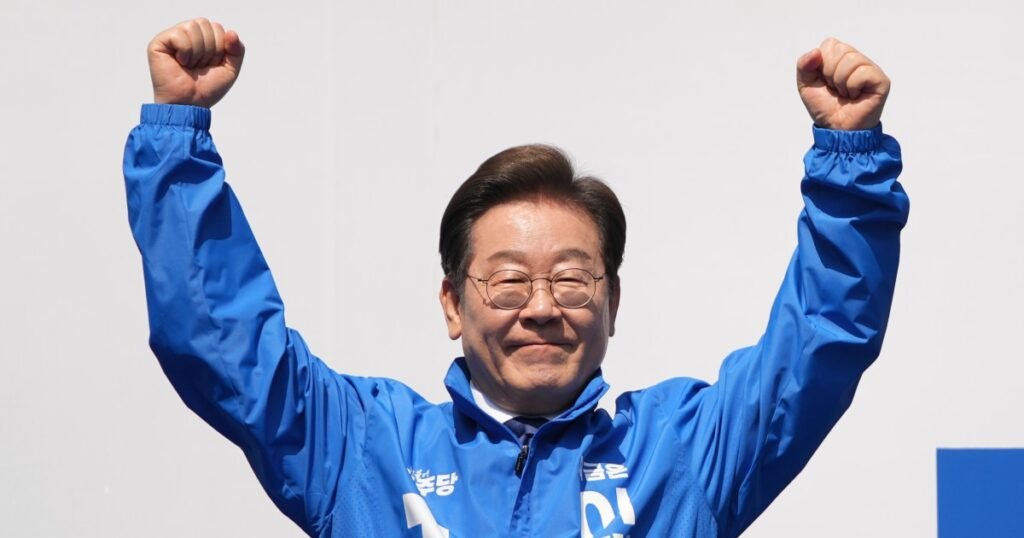Lee Jae-myung’s challenging journey to becoming South Korea’s president reflects the nation’s remarkable transformation from extreme poverty to a prominent global economy.
Born in 1963, Lee, a lawyer who rose to prominence amid various controversies, entered a world where South Korea’s GDP per capita was on par with some sub-Saharan African countries.
During that time, South Korea’s poverty was so acute that even Lee’s birth date remains uncertain—his parents delayed registering it for about a year, mindful of the high infant mortality rates common then.
Lee’s early life was fraught with hardship, including working in factories as a child.
Characterized by his populist and candid approach, Lee has credited his modest beginnings for shaping his progressive ideologies.
“Poverty is not a fault, but I became acutely aware of the unfairness caused by it,” Lee expressed in a 2022 address.
“My political involvement stems from a desire to assist those still trapped in hardship and despair, as I once was, by fostering a just society filled with hope.”
As the fifth child of seven, Lee left school in his early teenage years to move to Seongnam, near Seoul, to help support his family.
At just 15, he suffered a factory accident while working at a baseball glove factory, which left him with a permanent injury to his left arm.
Despite lacking formal education for several years, he completed middle and high school by studying for exams in his free time.

In 1982, he enrolled in Chung-Ang University in Seoul to study law and successfully passed the bar exam four years later.
Throughout his legal career, Lee was noted for advocating for marginalized individuals, including victims of workplace accidents and residents facing displacement from urban developments.
Lee’s political journey began in 2006 with an unsuccessful campaign for mayor of Seongnam, followed by a failed attempt to secure a parliamentary seat two years later.
In 2010, he finally found success, winning the mayoral election in Seongnam, and was re-elected four years later.
From 2018 to 2021, Lee served as the governor of Gyeonggi Province, the most populated area surrounding Seoul.
As both mayor and governor, he garnered attention with his populist economic initiatives, including a limited form of universal basic income.
After his tenure as governor, Lee became the Democratic Party’s candidate for the 2022 presidential election but lost to Yoon Suk-yeol by a mere 0.73 percent—historically the narrowest margin in South Korea.
Despite dealing with multiple political and personal scandals that have led to five legal charges, Lee guided the Democratic Party to a significant victory in the 2022 parliamentary elections, winning 173 seats in the 300-seat National Assembly.
After Yoon’s impeachment and removal from office following a failed martial law declaration in December, Lee secured his party’s nomination with overwhelming support, achieving nearly 90 percent of the primary vote.
“He communicates in a clear and straightforward manner and is skilled at identifying social and political trends—a rare trait among his peers in Korea,” stated Lee Myung-hee, a political expert at Michigan State University, to Al Jazeera.
“However, this straightforward approach can sometimes impede his political progress, as it can easily upset his rivals.”
During his campaign, Lee toned down his progressive image, opting for a more pragmatic approach and a gentler version of the populist economic policies that boosted his national profile.
In the lead-up to the election, Lee’s victory seemed secure, as his nearest competitor, Kim Moon-soo of the conservative People Power Party, lagged by more than 20 points in many polls.
‘A progressive pragmatist’
As president, Lee has committed to focusing on the economy. His proposals include significant investments in artificial intelligence, the introduction of a four-and-a-half-day work week, and tax breaks for families based on the number of children they have.
In foreign policy, he has promised to improve relations with North Korea while advocating for its denuclearization, which aligns with the traditional Democratic Party stance, and to maintain a strong US-Korea security alliance without alienating China and Russia.
“I would describe him as a progressive pragmatist. I doubt he will adhere rigidly to either progressive or conservative ideologies,” said Yong-chool Ha, director of the Center for Korea Studies at the University of Washington, to Al Jazeera.
“Critics label him as manipulative, while his supporters see him as adaptable,” Ha noted.
“He’s certainly a survivor.”
While Lee will start his term with a substantial majority in the National Assembly, he will inherit a society deeply divided and fragmented following Yoon’s impeachment.
“The South Korean political scene is still very polarized and confrontational, and how he navigates this landscape will determine his success,” commented Lee, the Michigan State University professor.
Lee will also face a challenging international atmosphere influenced by conflicts in Gaza and Ukraine, global power rivalries, and the shifting dynamics of international trade instigated by U.S. President Donald Trump.

For Lee, his election marks an incredible resurgence after two prior unsuccessful presidential campaigns, highlighting his against-the-odds ascent.
He had been embroiled in five legal cases, including accusations of electoral misconduct and corruption related to land deals.
Post-election, it is highly likely that Lee will avoid any trials during his five-year presidency.
According to South Korean law, sitting presidents are generally shielded from legal prosecution unless it’s for insurrection or treason—though legal experts debate whether this protection includes ongoing legal cases.
To clarify the situation, the Democratic Party recently introduced an amendment to the criminal code specifying that legal proceedings against an elected president must be halted until their term concludes.

